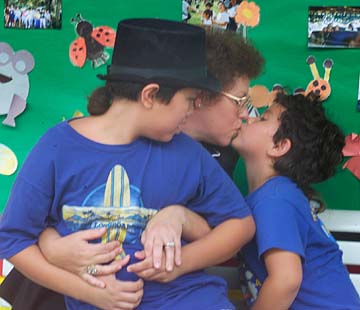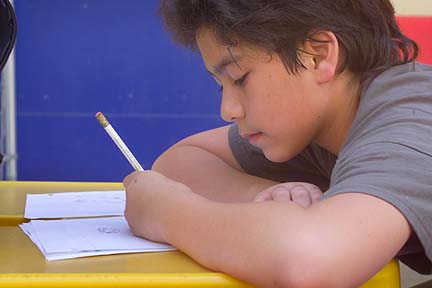


|
Special-ed parents Tammy Mata's 10-year-old son, Steven, diagnosed with a learning disability, has not been in school for more than 100 days because she and his school disagree on the best course for his educational needs.
perceive threats
They say schools are quick to
mention CPS if they disagree
about educational servicesBy Crystal Kua
ckua@starbulletin.comAs a result, Tammy Mata went to court earlier this month to answer allegations by the Department of Education that she has been neglecting her son's education.
"I got served to go to Family Court because they say I'm depriving my son of education," the Maui woman said.
On Thursday she went to court to deny the allegations, and a trial is scheduled for May 16.
Mata is one of several parents of special-needs children who say that schools have used or followed through with threats of calling police or Child Protective Services to report parents for neglect or abuse if parents do not agree with the school's plans for their child's educational or mental health services.
"You feel powerless over something that you have no control," said Mata. "Basically, we're being threatened for looking out for the best interest of our child."
A 1993 lawsuit led to the federal consent decree named for special-needs student Jennifer Felix. The state was sued for violating federal law by not providing appropriate mental health and educational services.
Federal law and the Felix consent decree require that services for special-needs students be determined by a team consisting of school officials, mental health professionals and parents.
The team is responsible for detailing a child's individual education program, commonly referred to as an IEP.

|
But the IEP process has been known to be adversarial with parents who many times disagree with the school's offer of services.Because schools also are mandated by law to report instances of abuse and neglect, parents and advocates say schools use the reporting law at times as a tool to pressure parents to go along with the school's offer of educational and mental health services.
"They are using every threat there is to parents," said parent Linda Daguio of Honolulu.
"The minute we disagree, they snatch the kids," said Sharon Landry, co-parent chairwoman of the East Hawaii Children's Community Council on the Big Island.
State Superintendent Pat Hamamoto said the Department of Education does not use the law as strategy when an IEP does not go the school's way. "That's not our position," she said.
Hamamoto said that the law is clear about when a school should call police or CPS when abuse and neglect are suspected.
"We file for a petition for educational neglect if it appears that a student is not attending school if we have worked very hard to get the student to school," Hamamoto said.
Mata said she pulled Steven out of a residential behavioral treatment facility on Christmas Eve out of concern for his safety.
Lihikai School refused to provide services because she took Steven out of the facility without proper medical clearance, said Mata, who noted she disagreed with his placement in the facility from the start.

|
Since then, her son has not received academic services and started only a month ago to receive mental health services.Mata wants her son to return to school, but the school believes he should be placed in a hospital or residential setting, she said. In the meantime, Mata said, Steven is in limbo.
"I just want to see that my kids get what they deserve," said Mata, who has a second son with special needs.
Mata said she believes she is being targeted in retaliation for going public with her criticisms of the special-education system.
"I feel strongly that because I was in the newspaper and in the news that they're making it harder on me."
Lihikai School's principal did not return a phone call seeking comment.
Susan Chandler, director of Department of Human Services, under which CPS falls, said her department investigates thousands of cases of abuse and neglect, and last year, 15 percent of all confirmed reports of abuse came from schools.
Chandler acknowledged that the mere mention of CPS can cause fear among parents.
"It's pretty scary initials."
But she said she has not heard of instances where CPS was used to coerce parents to comply with schools' wishes on IEP. Chandler also said that she would probably not hear of mere threats of CPS intervention, only cases actually reported.
She also said the standards for CPS intervention are high, and allegations of bad parenting, for example, would not necessarily generate a CPS case.
"It would have to be a child is abused or neglected," she said. "The mandate is child protection."
Daguio said the threat of CPS intervention is not a new tactic. Her oldest son, Aaron, is now 12 and diagnosed with an autism-related disorder.
But Aaron was originally diagnosed with attention deficit hyperactivity disorder, and in 1997, Daguio was skeptical of the diagnosis and the medication that he was required to take.
"I was absolutely frantic. I had heard rumors that schools were forcing medication on children. And I said, 'This is not going happen.'"
A state Health Department official investigated Daguio's concerns but determined that the medication was needed, Daguio said.
When Daguio remained wary of the medication, she was told by the official, "By not medicating your child, I can call CPS and have your child removed for neglect," Daguio said.
The Health Department official could not be reached for comment. Christina Donkervoet, chief of the Child and Adolescent Mental Health Division, said she did not know the particulars of Daguio's allegations but added that educational neglect intervention is a rare occurrence and is only seen in extreme circumstances involving special-needs children.

|
"I am not aware of any cases where an (educational) neglect was based upon what we've requested because of a family's reluctance to use medication for their child," Donkervoet said. "We try to work with families and IEP teams around those types of situations."But parent advocate Naomi Grossman, who sits on dozens of IEP meetings, said she is seeing the threat used more and more. "It's a scare tactic," Grossman said.
The parents of 12-year-old Rachel Kapu said a state attorney representing the DOE threatened them with a referral to CPS when they said they wanted to pursue home-schooling for their daughter.
Rachel's father, Keeaumoku Kapu, said the threat came during a mediation hearing during which they said they wanted to bring their daughter home to Maui for school, where they want her to be mainstreamed into regular-education classes and have a full-time interpreter.
Rachel, who is deaf, receives speech and language therapy at the Hawaii Center for the Deaf & the Blind in Honolulu. She lives in a dormitory there and flies home on weekends to be with her family in Lahaina.
Gary Kam of the state Attorney General's Office, said he made no threats to refer the case to CPS and was "thinking out loud" that there may be "CPS implications if a child's (educational) needs are not being met."
"I certainly did not threaten anyone with it," Kam said.
The state has taken no action in referring the case to CPS, he said, adding that he did not know of any Felix-related situations "bad enough that would need a referral to CPS."
Rachel's mother, Uilani Kapu, said she wants to remove Rachel from the Center for the Deaf & the Blind because she hides and cries when she has to go back to school. Her father said the family wanted Rachel home after she was stuck on Oahu for two weeks after Sept. 11 and because "she's still at a second-grade level, and she's in the sixth grade."
Star-Bulletin reporter Lisa Asato contributed to this report.
State Department of Education